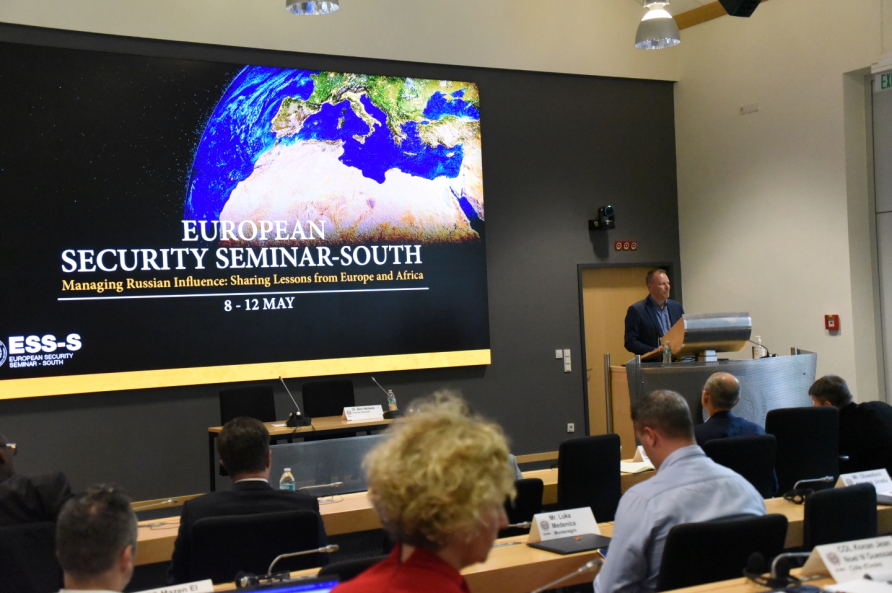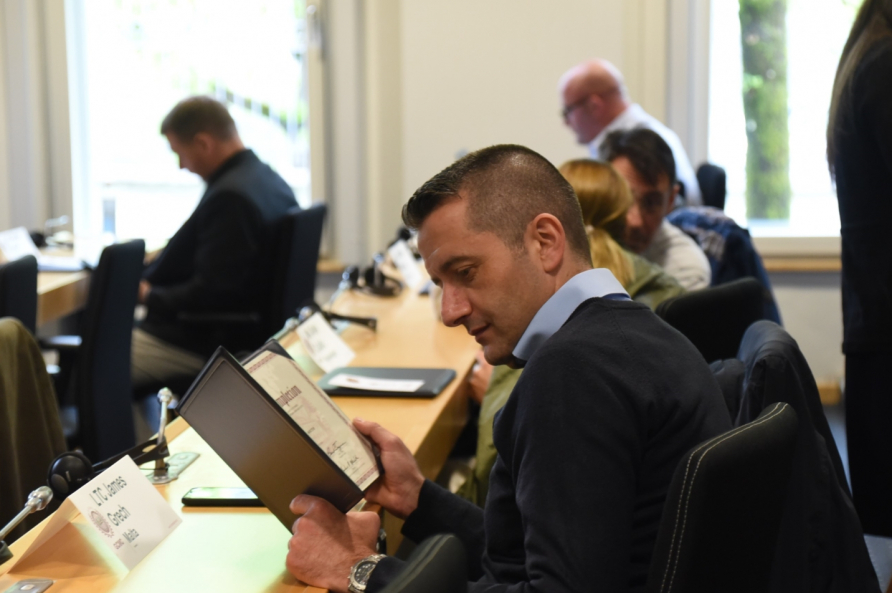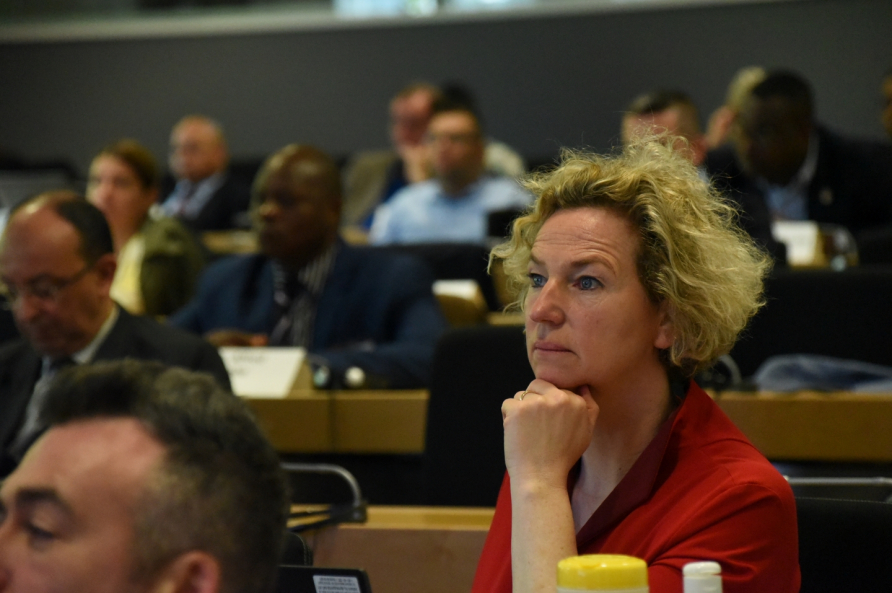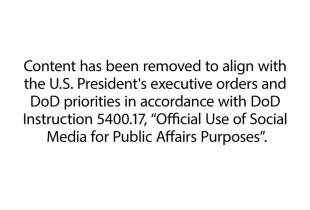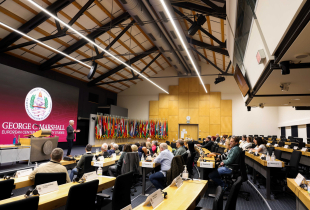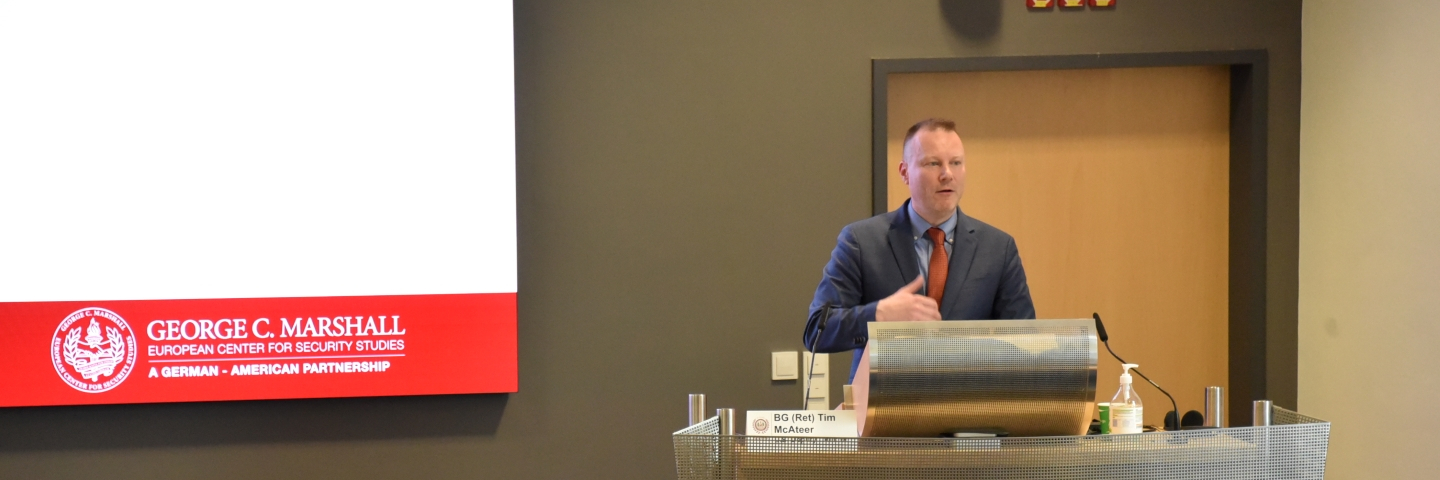
ESS-S Examines ‘Managing Russian Influence: Lessons from Europe and Africa’
The European Security Seminar – South (ESS-S), which brought together 42 participants from 27 countries in Africa, Europe, the Middle East, and North America, concluded last week here at the campus of the George C. Marshall European Center for Security Studies in Garmisch Partenkirchen. The theme of the seminar was “Managing Russian Influence: Sharing Lessons from Europe and Africa.”
“This seminar seeks to develop a critical understanding of Russian influence on both continents,” said course director Dr. Ben Nickels in his opening remarks. “And the diverse geographic background of the participants, consisting of mid-level security professionals from both military and civilian backgrounds, helps us achieve this goal.”
The first panel on Russian regional and global strategy examined the different outcomes of Russia’s invasion of Ukraine and their global implications. Zeroing in on Africa, Dr. Joseph Siegle, Director of Research at the Africa Center for Strategic Studies, explained the strategic objectives and security implications of Russia’s engagement.
“What’s often not recognized by African proponents of Wagner deployments is that Russia is not planning to leave anytime soon,” said Siegle, warning against the “inherent destabilization” of Russian involvement. “Strengthening African capacity to counter disinformation, more strongly supporting the UN and African Union, and not recognizing leaders who come to power through unconstitutional means are key approaches to reducing countries’ vulnerabilities to Russian influence,” he added.
Another panel focused on diplomacy and ideology. Financial Times’ Aanu Adeoye provided an on-the-ground perspective on the rationales for African governments to cooperate with Russia.
“When your house is burning, you don't care where the help is coming from,” said Adeoye, while also highlighting legitimate grievances with the West.
"The narrative of democracy versus autocracy does not seem to be sufficient in the Sahel, as it is perceived as biased. It needs to be reframed to be effective in the Sahel,” cautioned Dr. Tatiana Smirnova of the Centre FrancoPaix when discussing the ways to address and balance Russia’s efforts.
Additional topics examined Russia’s geo-economics engagement with African countries, highlighting the shift in trading since the start of the invasion, as Russia’s economy has been decoupled from Western markets. The panelists underscored Russia’s role as a major supplier of armaments and wheat to many African countries, but, with Russia accounting for a mere 1% of investment on the African continent, also pointed to the limits of this role.
Moving from the official to the unofficial part of Russia’s engagement, including the cyber domain, participants examined its extensive disinformation apparatus and its use in hybrid attacks.
“To effectively counter Russian influence and disinformation campaigns, cyber security and information security need to be integrated and implemented together,” said Viktoras Dauksas, Head of Debunk.org.
The disinformation topic was further explored analyzing Russia’s use of proxy forces and instrumentalization of criminal networks. Providing an overview of the activities of Wagner Group as well as other private military companies linked to the Russian government, Dr. Sam Ramani, Associate Fellow at the Royal United Services Institute for Defence and Security Studies, emphasized that “the information war is critical in disabling the Wagner Group’s influence in Africa.”
The seminar also considered responses in four different regions, comparing the Western Balkans, Western Sahel, Black Sea, and Red Sea which reflected the need for responses to the opportunistic and audience-specific style of Russian engagement. Providing a perspective on Russia’s involvement in the Libyan Civil War, Mr. Anas El Gomati, Director of the Sadeq Institute, challenged participants by observing that “NATO’s southern flank has largely been ignored.”
The panels found that in the Black Sea and Balkan regions, Russia's engagement focuses on economic and energy cooperation, and its engagement on the African continent, whereas in the Red Sea or the Sahel, it relates primarily to security cooperation and the extraction of resources. Notwithstanding the relevant security considerations on account of Russia’s engagement, Dr. Harry Verhoeven, Senior Research Scholar at the Center on Global Energy Policy at Columbia University, cautioned against what he called “the danger of Cold War memories resurfacing and informing European or North American security policy vis-à-vis African and Middle Eastern states.”
The intensive five-day seminar concluded with briefings summarizing the key takeaways from the sessions and providing recommendations on how European and African actors can manage Russian influence in their respective regions. The breadth of topics and issues covered highlighted the need for consistent action, communication, and cooperation among Western and African states, as well as the need for resilience, good governance, and transparency, leaving participants with a variety of insights and perspectives, but also new ideas and approaches.
The George C. Marshall Center for Security Studies, founded on June 5, 1993, is a renowned international security and defense studies institute. A bilateral partnership between the U.S. and Germany, it is a lasting cooperation that promotes dialogue and understanding among the nations of North America, Europe and Eurasia. In 2023, the Marshall Center marks its 30th anniversary, re-emphasizing its commitment to carrying Marshall’s vision, an enduring legacy that continues through the security education initiatives of the Center.
